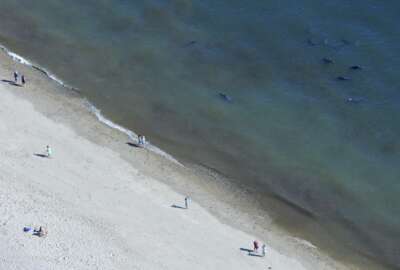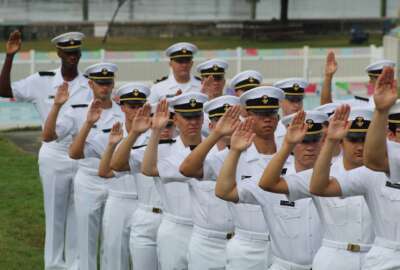How the Coast Guard deals with sexual assaults aboard U.S. flagged ships
Sexual assault and harassment at sea has been a problem for cadets at the U.S. Merchant Marine Academy. Twice in recent years, it's had to interrupt its Sea Year...
Best listening experience is on Chrome, Firefox or Safari. Subscribe to Federal Drive’s daily audio interviews on Apple Podcasts or PodcastOne.
Sexual assault and harassment at sea has been a problem for cadets at the U.S. Merchant Marine Academy. Twice in recent years, it’s had to interrupt its Sea Year program, under which students spend time on U.S. flag merchant vessels to gain experience. Recently, one mariner I interviewed said the Coast Guard is lax in dealing with reported incidents. For the Coast Guard’s response, Federal Drive with Tom Temin spoke with Rear Adm. John Mauger, the assistant commandant of the Coast Guard for prevention policy, and with Michael Berkow director of the Coast Guard investigative service.
Interview transcript:
John Mauger: Let me just be clear about something: Sexual assault, sexual harassment have no place in the maritime industry. And the Coast Guard is committed to preventing these occurrences and responding to allegations within our jurisdiction. And we have a broad range of authorities that we can bring to bear on this problem, both administratively and through the use of criminal authorities as well.
Tom Temin: Well, can the Coast Guard, I’m just trying to get a sense of what you’re able to do say at sea, if you know of any kind of criminal activity, sexual assault or anything else. Can you board US flag vessels? Can you stop them? And I mean, what are the powers that the Coast Guard has?
John Mauger: The Coast Guard has extensive jurisdiction over U.S. vessels. And when crimes occur on board U.S. vessels, they have to be reported to the Coast Guard and the Coast Guard has trained investigators that will respond. But prevention of these things starts well before anyone ever takes to sea. In a context of ensuring safety at sea, we issue credentials to the mariners that work on board these ships to ensure that they’re properly trained and qualified, but also to prevent anybody that’s been convicted of criminal activity from joining the merchant marine in the first place.
Tom Temin: In your experience do the captain’s or the high-level crew members of merchant marine ships – they’re not giant crews there. My understanding is there’s maybe 10 or 12 people that can crew one of these vessels. Are they all Americans American citizens, or can they be U.S. flagged but from another country?
John Mauger: So onboard U.S. vessels? It’s primarily U.S. mariners that are serving these vessels. And they’re subject to U.S. laws and jurisdiction.
Tom Temin: And so if someone, say a student at the Maritime Academy, I guess they’re going to reinstate Sea Year. And this is what we’re talking about the instances of SASH – sexual assault, sexual harassment – that happened during the Sea Year when they are on U.S. flag vessels, and they could be anywhere in the world. If they report, say, an incident to the Academy, does that somehow make it over to the Coast Guard as a general operational norm?
John Mauger: Tom, I’m going to kick it over to my colleague, Director Berkow who leads our Criminal Investigative Services here within the Coast Guard and just a sec, but first, let me just distinguish between sexual assault and sexual harassment. Sexual assault is a crime. And when it happens on board a U.S. vessel it has to be reported to the Coast Guard and director berkhout. and his team of investigators will have a trained investigator respond. Sexual harassment is not a crime, but it is a corrosive environment that undermines safety on board. And so it has to be dealt with through other means. Let’s talk for a minute here about the criminal aspects of sexual assault and what the Coast Guard is able to do.
Tom Temin: Michael Berkow, weigh in here.
Michael Berkow: Tom, so the the answer to your question is it depends what are they reporting? And where did the incident occur? If they’re reporting a crime, and that crime occurred on board a vessel, then absolutely, we are the responding criminal agency. So a little different than calling 911 when in a city. But if we get notified of a incident that occurred on a ship, historically or contemporaneously, were prepared to respond anywhere in the world so that that victim and that incident, and investigate, and the Coast Guard investigative service, our highest priority is sexual assault investigations. We have that responsibility inside the Coast Guard and for any commercial vessel U.S. flag. So we are prepared and trained to respond to these kinds of incidents. If they’re reporting a crime that occurs on the academy grounds, that’s a different matter and that’s not within our purview.
Tom Temin: Got it, yes, and the Academy has had that issue, you know, with sporting events and so forth. But we’re just talking about at sea, specifically during the Sea Year. And does the Coast Guard in the midst of or is it required to develop any particular rulemaking with respect to this? Or any regulations or is everything you need the tools you need on the books now?
Michael Berkow: Well, from a criminal perspective, we have the tools that we need now. Investigating crimes at sea is challenging because you always get into what is the flag state? Were you in international waters? How far were you off U.S. waters, etc. But U.S. flag vessels makes it pretty straightforward for us. And we have the jurisdiction that we need to investigate and take action. Please remember that we investigate, then that case has to be presented to a prosecutor who makes the decisions about whether or not to go forward with a prosecutorial decision. They operate under their own set of rules and requirements that are established by the Department of Justice. But if we are notified of a sexual assault or any other crime on a US flag vessel, we absolutely investigate. And we absolutely submit it to a U.S. Attorney’s Office for review and potential prosecution. The beauty of the Coast Guard is even if the prosecutor decides not to go forward with a criminal prosecution, much higher level of proof beyond a reasonable doubt, we can take that case and then I can pass that to Adm. Mauger. His team who can deal with it through administrative sanctions and using their regulatory powers.
Tom Temin: And how often does this occur in a given year? Do you have statistics on how many of these sexual assault charges get to the Coast Guard? And how many are you able to deal with in a given year?
Michael Berkow: What I’ll say to you is it’s a very low number. We don’t get a lot of reports. We’ve done a lot of outreach. In the last couple of years, we’ve done substantial outreach to the – not just to the Merchant Marine Academy, but to the other state maritime academies as well. And we’ve done a very aggressive campaign to try and get word out about the CGIS Tip Line, which allows people to communicate directly with us, which obviously gives us an edge if something is coming directly to us. And then we can respond quickly. But it’s challenging environment. These ships are moving around, they’re all around the world. They’re in port for a very short period of time. So we do not get a substantial number of reports.
Tom Temin: Were speaking with Michael Berkow, director of the Coast Guard investigative service, and with Rear Adm. John Mauger, the assistant commandant of the Coast Guard for prevention policy. To your knowledge, the U.S. Merchant Marine Academy only places cadets on U.S. flag vessels, I don’t think they can put them on say, a Panamanian or United Arab Emirates type of vessel or some other nation.
Michael Berkow: So my understanding is there in a wide variety of vessels from the Alaska Marine Highway System to Maersk ships to different a whole range of of shipping lines. So, I think it’s a wide variety but the U.S. flag.
Tom Temin: Maersk, for example, big international company, but they have subsidiaries with flags and probably a dozen nations.
John Mauger: I don’t know how many nations have subsidiaries, but they have a subsidiary here in the U.S.
Tom Temin: Sure. Alright. So then there was this major National Academy of Public Administration report that came out about the U.S. Merchant Marine Academy (USMMA). Coast Guard was not the subject of that study. But it sounds like the Coast Guard and the Academy have a pretty close working relationship in this and I guess many other matters.
John Mauger: So Tom, the Kings Point [New York] U.S. Merchant Marine Academy is one of the key maritime service academies that produces merchant mariners for service in in the U.S. fleet. And so we work very closely with the U.S. Merchant Marine Academy to ensure that their curriculum and their training and education program produces mariners that meet Coast Guard certification standards. And so we have a long history of working with U.S. Merchant Marine Academy to ensure that they’re producing the mariners that the nation needs to provide for our economic prosperity and our national security.
Tom Temin: And for a ship officer to be convicted of sexual assault, then the same sanctions that anyone else would get on land would apply to instances at sea.
Michael Berkow: If you’re talking about a criminal conviction that’s absolutely correct. But in addition there could be administrative sanctions that would come from Adm. Mauger’s team.
Tom Temin: So they could lose their license?
John Mauger: That’s right, Tom. Anybody that violates U.S. law or is convicted of misconduct on board a vessel is subject to administrative proceedings against their merchant mariner license and could bar them from working in the industry. Tom, I just come back to what I said at the outset that sexual assault and sexual harassment I have no place in the maritime industry. All of the mariners have a right to a safe and respectful work environment, their safety, our safety all depends on it. And sexual assault is a crime when it happens on board a U.S. vessel. The Coast Guard will investigate it with trained investigators and we will hold offenders accountable.
Tom Temin: Michael?
Michael Berkow: Sexual harassment certainly is on the continuum of harm, but the legal consequences in the civilian world are very different. Sex assault gets you prison, sex harassment may get you fired, it may get you retrained, you may have to go to specific sensitivity and training courses, but they’re radically different. Sex assault we investigate as a crime and we seek to prosecute and put people in jail. Sex harassment, we deal with administratively and regulatory.
Tom Temin: Can harassment also result in say that administrative action, loss of a license or –
John Mauger: It can. And so again, if there is a demonstrated example of harassing behavior or misconduct that can be grounds for revocation and suspension or revocation of license.
Copyright © 2025 Federal News Network. All rights reserved. This website is not intended for users located within the European Economic Area.
Tom Temin is host of the Federal Drive and has been providing insight on federal technology and management issues for more than 30 years.
Follow @tteminWFED





